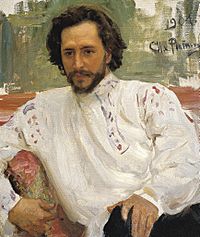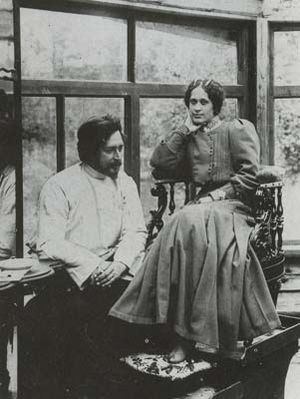Leonid Andreyev facts for kids
Quick facts for kids
Leonid Andreyev
|
|
|---|---|

Portrait of Andreyev by Ilya Repin
|
|
| Born | Leonid Nikolaievich Andreyev 21 August 1871 Oryol, Oryol Governorate, Russian Empire |
| Died | 12 September 1919 (aged 48) Mustamäki, Finland |
| Nationality | Russian |
| Alma mater | Imperial Moscow University (1897) |
| Period | 1890s–1910s |
| Genre | Fiction, Drama |
| Literary movement | Realism • Naturalism • Symbolism • Expressionism |
| Notable works | The Seven Who Were Hanged, The Life of Man, He Who Gets Slapped |
| Children | Daniil Andreyev, Vadim Andreyev |
| Signature | |
Leonid Nikolaievich Andreyev (Russian: Леони́д Никола́евич Андре́ев, 21 August 1871 – 12 September 1919) was a Russian writer. He wrote plays, novels, and short stories. Many people see him as a key figure in Expressionism in Russian literature. He was also one of the most talented writers during the Silver Age period. Andreyev's writing style combined parts of realism, naturalism, and symbolism. Out of his 25 plays, his 1915 play He Who Gets Slapped is often called his best work.
Contents
The Early Life of Leonid Andreyev
Leonid Andreyev was born in Oryol, Russia. His family was middle-class. He first studied law in Moscow and Saint Petersburg. His mother came from an old Polish noble family. She also had Ukrainian and Finnish ancestors.
How Andreyev Started Writing
Andreyev worked as a reporter for a Moscow newspaper. He covered stories from the local courts. At this time, he also wrote poetry. He tried to get his poems published, but most publishers said no.
In 1898, a newspaper in Moscow published his first short story. It was called "Bargamot and Garaska." A famous writer named Maxim Gorky read it. Gorky told Andreyev to focus on writing. Andreyev then stopped working in law. He quickly became a well-known writer. He and Gorky stayed friends for many years. Through Gorky, Andreyev joined a literary group called Sreda. He published many of his works in Gorky's collections.
Andreyev's First Successes
Andreyev's first collection of short stories came out in 1901. It sold a quarter-million copies very quickly. This made him a literary star in Russia. In 1901, he published "The Wall." In 1902, he published "In the Fog" and "The Abyss."
From 1898 to 1905, Andreyev wrote many short stories. They covered various topics. He wrote about life in Russian towns. He also wrote about court and prison events. He used what he learned from his law work for these stories. He was very interested in psychology. This helped him create memorable characters. These characters later became classics in Russian literature. One example is from his 1902 story "Thought."
Andreyev's Works and Political Views
During the first Russian revolution in 1905, Andreyev was active in public discussions. He supported democratic ideas. Several of his stories showed the mood of this time. These included "The Red Laugh" (1904) and "Governor" (1905). Another important story was The Seven Who Were Hanged (1908).
Plays and Theatre
Starting in 1905, he also wrote many plays. These included The Life of Man (1906) and Tsar Hunger (1907). Other plays were Black Masks (1908) and Anathema (1909). The Days of Our Life (1909) was also popular. The Life of Man was performed in 1907. It was staged by two leading figures in Russian theatre. These were Konstantin Stanislavsky and Vsevolod Meyerhold.
After the 1905 revolution, Andreyev's works often showed a sad and hopeless mood. By the early 1910s, his fame started to fade. New writers like the Futurists became popular.
His Most Famous Play
Andreyev finished his most famous play, He Who Gets Slapped, in August 1915. It premiered at the Moscow Art Theatre in October 1915. An English version of the play was very successful on Broadway in 1922. This play has been made into several films. It has also been adapted into a novel, an opera, and a musical. It is his most performed play around the world.
Later Life and Legacy
Andreyev published little after 1915, apart from his political writings. In 1916, he became the editor of a newspaper's literature section. He supported the February Revolution of 1917. However, he believed the Bolsheviks taking power would be a disaster.
In 1917, he moved to Finland. From his home there, he wrote messages to the world. He spoke out against the Bolsheviks' actions. Andreyev was an idealist and a rebel. He spent his last years in great poverty. His early death from heart failure may have been made worse by his sadness. This sadness was over the results of the Bolshevik Revolution in November 1917. He finished his last novel, Satan's Diary, just days before he died.
Andreyev's Works in English
A play called The Sorrows of Belgium was written at the start of World War I. It celebrated the bravery of the Belgians. This play was produced in the United States. Other plays like The Life of Man (1917) and He Who Gets Slapped (1922) were also performed there. Anathema (1923) was another. A popular film version of He Who Gets Slapped was made by MGM Studios in 1924. Some of his works were translated into English by Thomas Seltzer.
Poor Murderer, a play based on his short story Thought, opened on Broadway in 1976.
Andreyev's Family Life
Leonid Andreyev was married to Alexandra Veligorskaia. She was a niece of Taras Shevchenko. She passed away in 1906 due to an illness after childbirth. They had two sons. One was Daniil Andreyev, a poet. The other was Vadim Andreyev. In 1908, Leonid Andreyev married Anna Denisevich. He decided to separate his two young boys. He kept his elder son, Vadim, with him. Daniil went to live with Aleksandra's sister. Vadim Andreyev also became a poet and lived in Paris.
Andreyev's Influence on Other Writers
During the years 1914-1929, many people in America were interested in Edgar Allan Poe. Andreyev was seen as Russia's version of Poe. Because of this, his translated works found many readers in English-speaking countries. His books were widely translated. Examples include The Crushed Flower, and other stories (1916) and The Little Angel, and other stories (1916). When The King Loses His Head, and other stories (1920) was another. His stories also appeared in Weird Tales magazine in the 1920s. For example, "Lazarus" was in the March 1927 edition.
Leonid Andreyev's granddaughter is Olga Andrejew Carlisle. She is an American writer and poet. In 1987, she published a collection of his short stories called Visions.
Andreyev's Impact on Horror Writers
Andreyev is often called 'a Russian Edgar Allan Poe'. He influenced two great horror writers: H.P. Lovecraft and R.E. Howard. Copies of his books The Seven Who Were Hanged and The Red Laugh were found in H.P. Lovecraft's library. This was noted in a list by S.T. Joshi. Robert E. Howard also believed Andreyev was one of the seven "most powerful" writers of all time.
See also
 In Spanish: Leonid Andréiev para niños
In Spanish: Leonid Andréiev para niños


